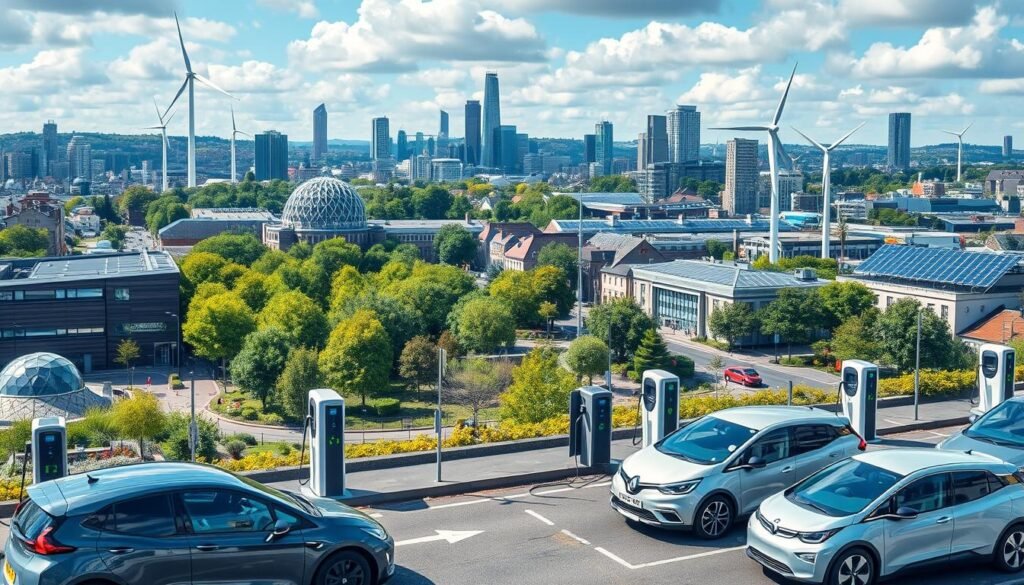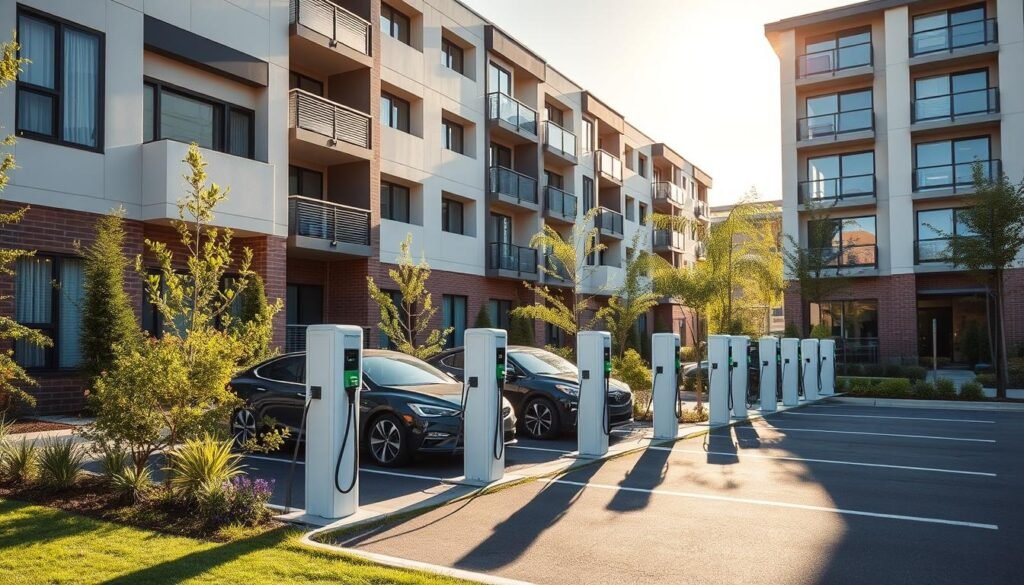Are you a landlord dealing with electric vehicle (EV) charging requests from tenants? You’re not alone. The UK is moving fast towards sustainable transport, making this a common issue for property managers. This guide will help you understand EV charging installations, balancing what your tenants want with what’s best for your property.
The world of property management is changing, with EV charging becoming a wanted feature. Recent data shows 86% of freehold landlords with the right properties would install an EV charge point if asked. This shows how important it is to make rental properties eco-friendly and meet the UK’s green goals.
As a landlord, you’re probably thinking about the costs and benefits of installing an EV charger. While 20% of landlords pay for it themselves, others might share the cost or ask tenants to pay. It’s not just about money; it’s about making your property more attractive and future-proof in a competitive market.
Key Takeaways
- 86% of UK freehold landlords would consider EV charger installation upon tenant request
- Government grants are available to offset installation costs for landlords
- EV charging points can increase property value and attract tenants
- Landlords should consider cost-sharing options and written agreements with tenants
- Future-proofing properties with EV infrastructure is becoming increasingly important
Understanding the Current EV Charging Landscape for UK Landlords
The UK’s electric vehicle market is growing fast. This brings new challenges and chances for landlords. As more people choose electric cars, having easy-to-use charging points is key.
The Growing Demand for EV Charging Points
The rise in electric cars is changing city streets. Companies like Itselectric are creating new charging solutions. They offer level-2 curbside chargers that link to building panels.
This makes charging as easy as finding a fire hydrant. It helps solve the problem of not enough charging spots.

Current Statistics on EV Adoption in the UK
UK electric vehicle stats show a big change in cars:
- One in 40 vehicles in the UK are now zero-emission, including 960,896 cars.
- 35.7% of Britons live in rented properties, which could affect landlords.
- The government wants all cars to be zero-emission by 2035.
Legal Requirements and Tenant Rights
It’s important for landlords to know their duties and tenants’ rights. Even though they don’t have to service EV charge points yearly, it’s wise for safety and efficiency. The Electric Vehicle Chargepoint Grant now helps those without parking, which might change how landlords think about their properties.
| Aspect | Details |
|---|---|
| Installation Costs | £500-£1,000 for standard 7kW charger |
| Government Grant | Up to £350 for eligible installations |
| Charging Costs | Public: £0.75/kWh, Home: 9.5p/kWh (off-peak) |
Benefits of Installing EV Chargers for Landlords
Installing electric vehicle (EV) chargers brings many benefits for landlords in the UK. As more people choose eco-friendly transport, landlords who install EV chargers can gain a lot. This move can lead to significant rewards.
Property Value Enhancement
EV charging points can increase your property’s value. Many landlords, 40%, install these units to boost their property’s worth. With more zero-emission vehicles on UK roads, the need for charging facilities is growing.
Increased Tenant Attraction
EV chargers help attract tenants. The UK aims to have zero-emission vehicles by 2035. This means more people will look for rental properties with EV chargers. Landlords can attract eco-conscious tenants and possibly reduce vacancy periods.

Rental Premium Opportunities
Installing EV chargers can lead to higher rents. 86% of freehold landlords are willing to install an EV charger if asked. This shows how much tenants value this amenity. Landlords can charge more for this convenience, covering costs and increasing profits.
| Benefit | Percentage of Landlords |
|---|---|
| Willing to install EV charger on request | 86% |
| Install to increase property value | 40% |
| Cover installation cost for tenant | 20% |
While 26% of landlords worry about extra costs and upkeep, the benefits often outweigh these concerns. Government grants can help with the initial costs. This way, landlords can enjoy the long-term benefits of EV charging.
Available Government Grants for Landlord EV Installations
The UK government supports landlords in installing electric vehicle charging points. These grants help lower costs and promote eco-friendly transport.
OZEV EV Chargepoint Grant Details
The Office for Zero Emission Vehicles (OZEV) offers the Electric Vehicle Chargepoint Grant (EVCG). It covers up to 75% of the installation cost, or £350, whichever is less. Landlords can get up to 200 grants a year for properties with parking.
Infrastructure Grant for Residential Car Parks
For bigger properties, the Electric Vehicle Infrastructure Grant is available. It gives up to £30,000 or 75% off the total cost. This is great for apartment complexes or housing estates.
Grant Application Process
To get this support, landlords must follow a few steps:
- Choose an OZEV-approved installer
- Get a quote for installation
- Fill out the grant application form
- Submit the needed documents
- Wait for approval before starting the installation
Landlords can use these grants together on one property. This can help them save more money on EV charging infrastructure.
Cost Considerations and Financial Planning
EV charger installation costs are a big deal for landlords. Our research found that 35% of landlords want tenants to pay for these costs. Meanwhile, 30% are open to sharing the costs. It’s important to plan finances well to make sure the investment pays off.
Think about both the upfront costs and the long-term gains. Installing an EV charger can cost between £500 and £1,500 per point. This cost depends on the system and the property’s layout. But, it could also make your property more valuable and attract green-conscious tenants.
To help you decide, we’ve listed typical costs and potential benefits:
| Item | Cost/Benefit | Notes |
|---|---|---|
| Installation Cost | £500 – £1,500 | Varies based on charger type and property layout |
| Annual Maintenance | £50 – £100 | Regular checks and minor repairs |
| Potential Rent Increase | £20 – £50 per month | Depends on local market conditions |
| Property Value Increase | 1% – 3% | Estimated based on current market trends |
Make sure to have a clear agreement with your tenant about who pays for what. This will prevent any future problems. It ensures the EV charging setup goes smoothly at your property.
Installation Options and Technical Requirements
Landlords need to think carefully about EV charger installation. They must consider what their tenants need and what their property can handle. It’s important to know about different EV charger types, what’s needed for installation, how fast they charge, and the electrical setup.
Single-Point vs Multi-Point Solutions
Single-point chargers work best for places with their own parking spots. For shared parking, multi-point systems are better. Untethered lead options let tenants use their own cables, adding flexibility.
Infrastructure Requirements
Checking your property’s electrical capacity is key. Most homes can fit a 7.4kW charger. But, you might need to upgrade for quicker charging. The cost of installation varies, but it’s usually around £5,760.
Government grants can help, cutting the cost to £1,440. This covers up to 75% of the expenses.
Choosing the Right Charging Speed
Charging speed affects both cost and convenience. Here’s a quick guide:
- Slow chargers (3-7kW): Add about 15-30 miles of range per hour
- Fast chargers (7-22kW): Provide 30-90 miles per hour
- Rapid chargers (50kW+): Can add 200+ miles in an hour
Rapid chargers are fast but more expensive. They might need big electrical upgrades. Most homes choose 7.4kW chargers for a good balance of speed and cost.
If you can afford it, think about installing a higher capacity charger. This makes your property more appealing to EV owners in the future.
My tenant is asking for a car EV charger. What should I do? – UK Landlords guide
Landlords face a tough choice when tenants ask for EV chargers. This guide helps you make a smart decision. It looks at the benefits for your property in the long run.
Initial Assessment Steps
Start by checking your property’s electrical setup and parking. This will tell you if an EV charger is possible. Get advice from an OZEV-approved installer to know what you need and how much it will cost.
Communication with Tenants
Talking openly with your tenants is key. Ask about their needs, how much they’ll use it, and if they can help with costs. This way, you both know what to expect and can work well together.
Decision-Making Framework
Think about these points when deciding:
- How it will improve your property’s value
- Keeping your tenants happy and them staying longer
- Grants and financial help available
- Future trends in electric cars
- Legal and planning rules
| Factor | Consideration |
|---|---|
| OZEV Grant | Up to £350 off chargepoint cost |
| Infrastructure Grant | Up to £500 per bay (max 60 bays) |
| Planning Permission | Required for installation |
| Third-party Permissions | Necessary before application |
By looking at these points carefully, you can make a fair choice. This choice will benefit you and your tenants.
Landlord-Tenant Agreements for EV Charging
When tenants ask for EV charging, landlords need clear agreements. These agreements are key to managing the property well. They must consider legal aspects carefully.
The agreement should cover who installs, uses, and maintains the charger. It’s important to decide who pays for costs and repairs. Also, how energy is used and billed should be clear.
- Installation costs and process
- Ownership of the charging unit
- Maintenance responsibilities
- Energy usage and billing procedures
- Removal or transfer conditions upon tenancy end
Getting legal advice is a good idea. This ensures your agreement follows UK laws and protects your investment. A good EV charging agreement can make your property more attractive. It might even increase the rent you can charge.
| Agreement Component | Landlord Responsibility | Tenant Responsibility |
|---|---|---|
| Installation | Arrange and oversee | Grant access |
| Maintenance | Regular checks | Report issues |
| Energy Costs | Provide separate meter | Pay for usage |
| Removal | Manage process | Allow access |
Maintenance and Ongoing Responsibilities
Installing an EV charger on your rental property brings new responsibilities for landlords. It’s important to understand EV charger maintenance, safety regulations, ongoing costs, and your responsibilities. This knowledge ensures a smooth operation.
Service Requirements
While there’s no legal need for annual EV charger service, regular maintenance is a good idea. It keeps the charger working well and safe. Landlords should arrange for checks to make sure the charger meets safety standards.
Cost Distribution
It’s key to decide who pays for ongoing costs. Landlords might add maintenance costs to the rent or charge a separate fee. A clear agreement on who pays for repairs and upkeep avoids future problems.
Safety Considerations
Safety is crucial with EV charging. Landlords need to keep up with new safety rules and check the chargers regularly. The London Fire Brigade reported over 100 fires from battery-powered vehicles in 2023. This shows the need for proper installation and upkeep.
To reduce risks, landlords should:
- Give clear guidelines on how to use the charger
- Make sure there’s good ventilation in charging areas
- Ask tenants to tell them if they’ll keep EVs on the property
- Encourage the use of official chargers and battery checks
By focusing on these maintenance and safety points, landlords can offer a reliable and safe EV charging solution. This protects their property investment and benefits their tenants.
Future-Proofing Your Property Investment
As EV market trends keep changing, installing charging points is key for long-term rental property success. Without EV chargers, homes might find it hard to attract tenants, just like today’s homes without broadband.
To increase your property’s value and attract more tenants, think about these upgrades:
- Install higher capacity chargers for future-proofing
- Explore multi-point charging solutions for multi-unit properties
- Stay informed about evolving EV technology and charging standards
All Service 4U, trusted by Dominoes and McDonald’s, offers top EV charging solutions. Their certified pros give custom assessments and installations. This ensures your investment stays up-to-date.
| Benefits of EV Charger Installation | Impact on Property |
|---|---|
| Increased tenant attraction | Wider pool of potential renters |
| Enhanced property value | Competitive edge in the market |
| Future-proofed investment | Long-term financial stability |
With 96% of EV owners charging at home, offering this amenity boosts your property’s appeal. By working with experts like All Service 4U, you can make your property EV-ready. This secures your property’s future in the changing rental market.
Common Challenges and Solutions
Landlords face many challenges when thinking about installing EV chargers in their properties. It’s important to know these problems and how to solve them. This knowledge helps in managing properties well.
Installation Obstacles
Not enough parking and poor electrical setup are big hurdles. Some places might need big electrical work, which costs more. Think about using portable chargers or shared stations for many tenants.
Cost Management
Installing EV chargers can be very expensive at first. Look into sharing costs with tenants to help out. The Electric Vehicle Homecharge Scheme can pay up to £350 of the cost. A 7kW charger, priced around £1,000, is a good choice for its price and performance.
Tenant Turnover Considerations
It’s hard to handle charger ownership when tenants leave. Make clear rules about who does what and who pays for upkeep. Portable chargers are easy to move or give to new tenants.
| Challenge | Solution |
|---|---|
| Limited parking space | Portable chargers or shared stations |
| High installation costs | Government grants and tenant cost-sharing |
| Tenant turnover | Clear agreements and portable options |
Keep up with local rules on installing chargers to avoid problems. By tackling these issues early, landlords can make their properties EV-friendly.
Conclusion
The world of EV charging for landlords is changing fast. It brings both challenges and chances for making money and helping the planet. The UK has seen a big jump in EV charging points, up by 47% since February 2023.
Landlords need to keep up with this trend. Adding EV chargers can make a property more valuable. It also makes tenants happier.
The government is helping landlords by offering a 75% discount on EV charger installations. This can save up to £350. The LEVI Fund has also set aside £381 million to improve public charging points.
This is great news for properties without parking. It shows the government’s strong support for EV charging.
The UK needs about 2 million public EV charging points soon. Landlords who invest in EV charging now will be ahead. They’ll meet today’s tenant needs and prepare for the future of green housing.




